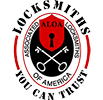ALOA Security Professionals Association, Inc.
The mission of ALOA, as dedicated members of the locksmith/security industry, is to ensure professional excellence and ethics; create a public demand for professional locksmith services; represent and speak for the locksmith/security industry; and expand the exchange of trade information and knowledge with other related organizations to preserve and enhance the industry.
What Does a Professional Locksmith/Security Professional Do?
A professional trained locksmith/security professional may do some or all of the following: install locks, deadbolts and other mechanical or electronic locking devices to safeguard homes, businesses, vehicles and other property. Locksmiths also may modify or repair such devices, rekey locks, make duplicate keys or cards, generate or program new keys/cards for locks whose keys/cards have been lost and respond to emergency calls to unlock vehicles, homes and businesses that have been locked accidentally, or whose locks have malfunctioned.
Some locksmiths install and service electronic alarm and surveillance systems. Many locksmiths specify, design, provide, install and service a wide range of electronic access control systems and closed circuit television (CCTV) systems. Because of the integration of electronic security systems with computers and networks, some locksmiths maintain security hardware and software for computer systems.
A locksmith may sell, service and install safes for home and business use. Banks have many locking devices and related hardware that require regular service by locksmiths such as; vault doors, time locks, safe deposit boxes and teller equipment.
A locksmith repairs a lock by disassembling and examining it to locate worn or malfunctioning parts, then cleans and adjusts the internal mechanisms and replaces these parts with new ones supplied by the lock's manufacturer. On occasion, it may be necessary to custom make some repair parts using lathes, drills, grinders, and other power and hand tools. When the repairs have been completed, the locksmith will reassemble the lock and check its operation.
A locksmith makes duplicate keys using a key-duplicating machine. With the customer's (pattern) key and key blank clamped in their respective vises, the locksmith moves the pattern key across the guide. A rotary cutter cuts the same pattern into the key blank. The locksmith carefully examines the new key to ensure its accuracy.
A locksmith may respond to emergency calls for customers who have accidentally become locked out of a home, business or vehicle. The locksmith begins by examining the lock(s) to determine the best method to circumventthe lock. These methods may include use of lock picks, bypass tools or other special instruments. Fitting a key by code or other skilled means is also a method of opening a lock. Experience, skill and knowledge dictate the method a professional selects to open a lock. There are times when the quality of the lock, concern for safety of occupants and other factors such as a malfunction of the lock may force the locksmith to use destructive techniques to gain entry. Before performing an emergency opening or certain other sensitive tasks, the locksmith may require positive ID procedures.
Why Use a Professional Locksmith?
Pick up any newspaper with an article about public concerns and the subject of crime usually tops the list. It's therefore surprising that homeowners and building contractors often don't use the services of a professional locksmith to analyze security needs for their properties. For example, the most common practice in new home construction is to piecemeal the security precautions-using one company to set up an alarm system, an electrician to hook up outdoor lighting for crime prevention, and carpenters perhaps to install low--grade locks and door hardware almost as an afterthought. Often critical options such as door frame structure, door reinforcement or floor safes aren't even thought of in time to incorporate those into the original building process.
"There are almost 10,000 members of the Associated Locksmiths of America-a number of which are certified locksmiths-available to builders, business owners and homeowners to ensure the physical safety of their property and, most important, their employees and families," says Robert E. Mock, ALOA's past president. "It's puzzling that owners make such substantial investments in their homes and businesses without taking care to secure them intelligently." The issue is more significant than just correct installation techniques. A qualified locksmith can make recommendations on what physical and electronic systems need to be chosen in the first place.
Today, the security marketplace is flooded with options often unknown to those in fields outside locksmithing. Even a vendor in a related industry who is aware of a new security product is unlikely to have the judgment or qualifications of a highly trained and experienced locksmith. Mock also cites concern about the growing number of companies that are only aware of, and trained in, a narrow portion of security service. "More and more, we are seeing companies marketing themselves as security providers who have minimal exposure to the security industry as a whole. Especially with the rapid onset of electronic security in common applications, we are running into more individuals who have negligible training in physical security--they have learned overnight to install something that they do not really understand, and they have little or no background in deciding whether the product choice is appropriate for a particular application. Often they are employed by companies that only make or produce one product; therefore it is unlikely that a comprehensive security analysis is going to take place for the customer.







